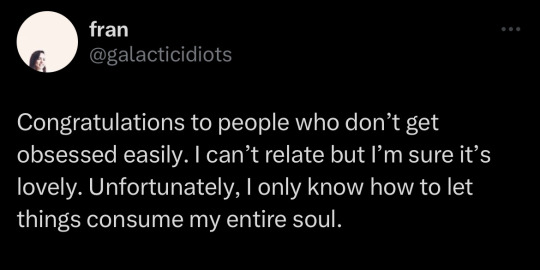Text
Unreliable narrators are one hell of an idea. You can just write whatever, and if a reader points out "hey the way this scene happened should not be physically possible if it's done the way this character described it", you can just be like "yeah I don't trust that fucker either."
36K notes
·
View notes
Text
i must not take it personal. taking it personal is the mind killer. taking it personal is the little death that brings total oblivion. i will face taking it personal. i will permit it to pass over and through me. and when it has gone past i will turn the inner eye to see its path. when the taking it personal has gone there will be nothing. only i will remain
18K notes
·
View notes
Text
The longer I live, the more deeply I learn that love — whether we call it friendship or family or romance — is the work of mirroring and magnifying each other’s light. Gentle work. Steadfast work. Life-saving work in those moments when life and shame and sorrow occlude our own light from our view, but there is still a clear-eyed loving person to beam it back. In our best moments, we are that person for another.
-James Baldwin
32K notes
·
View notes
Text
what Work is the most important? the work you have to do next. narrow the scope of focus down to that singular glittering point.
15K notes
·
View notes
Text
“stop traumadumping to your friends tell this to your therapist” my god they paywalled human connection
175K notes
·
View notes
Text
that picture of the little boy holding a puppy and smiling with the writing on the bottom that says hi daddy this is my doggy chelsea isn't she cute i love you and the picture of the cat with the writing that says our michael... pet photos of all time
147K notes
·
View notes
Text
“Every love song that we’ve ever heard is a constant reminder to us that that individuation is bullshit: “I can’t live without you.” That’s a commonplace formulation that ought to allow us to call radically into question, okay, the metaphysical terms that we have come to accept. If really, if ‘I can’t live without you,’ that’s a critique of I, of it’s very possibility. And we should follow that threat to the end. And we should follow that thread not only as a rhetorical formulation, but follow it at the level of our practices.”
— Fred Moten
43 notes
·
View notes
Text
Lauren Berlant:
…
“I often talk about love as one of the few places where people actually admit they want to become different. And so it’s like change without trauma, but it’s not change without instability. It’s change without guarantees, without knowing what the other side of it is, because it’s entering into relationality.
The thing I like about love as a concept for the possibility of the social, is that love always means non-sovereignty. Love is always about violating your own attachment to your intentionality, without being anti-intentional. I like that love is greedy. You want incommensurate things and you want them now. And the now part is important.
The question of duration is also important in this regard because there are many places that one holds duration. One holds duration in one’s head, and one holds duration in relation. As a formal relation, love could have continuity, whereas, as an experiential relation it could have discontinuities.
When you plan social change, you have to imagine the world that you could promise, the world that could be seductive, the world you could induce people to want to leap into. But leaps are awkward, they’re not actually that beautiful. When you land you’re probably going to fall, or hurt your ankle or hit someone. When you’re asking for social change, you want to be able to say there will be some kind of cushion when we take the leap. What love does as a seduction for this is, and has done historically for political theory, is to try to imagine some continuity in the affective level. One that isn’t experienced at the historical, social or everyday level, but that still provides a kind of referential anchor, affectively and as a political project.“
112 notes
·
View notes















